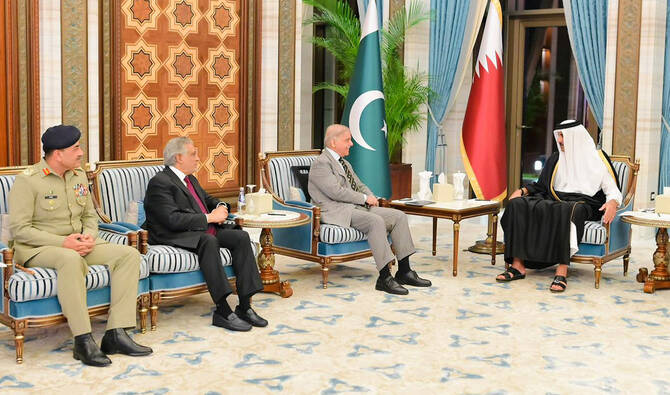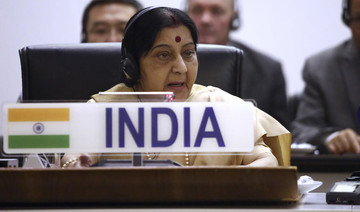ISLAMABAD: Dealing a blow to the already-strained bilateral ties between India and Pakistan, New Delhi said it would no longer participate in high-level talks to be held in New York this week, with Islamabad’s foreign ministry expressing “deep disappointment” at the move late on Friday.
The announcement made by India’s Ministry of External Affairs (MEA) threw the spanner in the works for planned talks between Indian Foreign Minister Sushma Swaraj and her Pakistani counterpart, Shah Mehmood Qureshi which were scheduled to be held on the sidelines of the United Nations General Assembly (UNGA).
The development took place just a day after India had agreed to the meeting.
“The reasons cited by the Indian side for the decision to cancel the Foreign Ministers’ meeting, within 24 hours of its public confirmation, are entirely unconvincing,” Pakistan’s Foreign Ministry said in a statement.
“The so-called ‘disturbing developments’ alluded to in the Indian statement predated the Indian agreement to hold the bilateral meeting in New York,” it added.
On Friday, India accused Pakistan of killing its security personnel in Kashmir, adding that it was “glorifying terrorism” by releasing postage stamps featuring Hizbul Mujahideen fighter, Burhan Wani, who was killed by Indian security forces in 2016.
“When the allegations of Pakistan’s involvement first appeared, the Pakistan Rangers clearly conveyed to (Indian) BSF (Border Security Force) through official channels that Pakistan had nothing to do with it,” excerpts from the statement said, adding that the “Pakistan Rangers also extended help in efforts to locate the soldier’s body. These facts were known to the Indian authorities and a part of the Indian media also reported that Pakistan had refuted its involvement.”
Accusing India of indulging in a “motivated and malicious propaganda,” Pakistan said it “categorically rejected these allegations once again and would be prepared to conduct a joint investigation to establish the truth.”
Stamps featuring Wani were issued before the July 25 general elections in Pakistan “as a result of which the government of Prime Minister Imran Khan assumed office,” the statement said.
“We believe by its ill-considered cancelation of the meeting, India has once again wasted a serious opportunity to change the dynamics of the bilateral relationship and put the region on the path of peace and development,” the Foreign Ministry said, echoing sentiments expressed by Qureshi earlier on Friday.
Reacting to India’s decision to cancel the talks, Qureshi said: “Pakistan had requested for the meeting in the larger interest of the region.”
“It seems that India is already preparing for its elections due in the country next year,” he said in comments to local news outlet Express Tribune, adding that there is a group in New Delhi that does not want the talks to take place.
In a tit-for-tat measure, Qureshi said Islamabad too would not feel the need to respond in haste if India were to approach Pakistan for dialogue in the future. “Pakistan extended the offer despite possessing evidence of Indian interference in Balochistan,” he said.
He concluded his statement by reiterating the need for a dialogue, saying that it was the only way to resolve issues.
Extending an invitation for talks between Qureshi and Swaraj, Prime Minister Imran Khan had written a letter to Indian PM Narendra Modi on September 14 as an official proposal for the meeting. At the time, he had reasoned that an informal meeting of the South Asian Association of Regional Cooperation (Saarc), on the sidelines of the UNGA, would be the ideal platform to restart the derailed talks.
On Thursday, MEA spokesperson, Raveesh Kumar, had confirmed that India would participate in the talks but not before quickly clarifying that “this should not be confused with the resumption of any dialogue; this is just a meeting on the request of Pakistan” and that this “this does not indicate any change in our policy as far as our stand on terrorism and cross-border terrorism is concerned.”
The United States had also welcomed the meeting between Pakistan and India, expressing hope that the stage for a “good, strong relationship between the two neighbors” would be set.
Pakistan’s Information Minister tweeted his disappointment at India’s decision saying that “the world is watching, Pakistan stands for peace, while Indian policies are being guided by extremist ideologies.”
Pakistan ‘deeply disappointed’ after India calls off talks
Pakistan ‘deeply disappointed’ after India calls off talks

- Foreign ministers from both nations were to meet on sidelines of UNGA
- New Delhi has once again wasted opportunity to change dynamics of relations, Islamabad says
Qatar, Pakistan resolve to boost strategic, economic cooperation at Doha talks

- Both countries urge dialogue on Afghanistan amid renewed border tensions between Islamabad and Kabul
- Discussions focus on bilateral trade and investment, energy, defense, manpower and labor and culture
ISLAMABAD: Pakistan and Qatar on Tuesday agreed to deepen their strategic and economic cooperation during high-level talks between Prime Minister Shehbaz Sharif and his Qatari counterpart Sheikh Mohammed bin Abdulrahman bin Jassim Al Thani, Sharif’s office said.
Sharif visited Qatar along with a high-level delegation on the invitation of Qatari emir Sheikh Tamim bin Hamad Al Thani. The Pakistani premier also held meetings with Qatar’s trade and defense ministers to discuss cooperation in various domains.
The visit came at a time when Pakistan is seeking closer economic engagement with Gulf partners amid its broader push to stabilize the economy and attract investment, while maintaining security and defense cooperation with key regional states.
During their meeting in Doha, PM Sharif and Qatar’s Sheikh Mohammed discussed bilateral relations and exchanged views on regional and international developments, according to the Pakistan prime minister’s office.
“They reaffirmed the strong brotherly relations between Pakistan and Qatar and expressed satisfaction at the growing momentum in political, economic and institutional ties,” Sharif’s office said.
“Discussions focused on enhancing cooperation in the fields of trade and investment, energy, defense, manpower and labor and culture, with both sides stressing the importance of their task force to accelerate cooperation in all these areas.”
Pakistan and Qatar maintain strong trade and investment ties. In 2022, the office of Qatar’s emir said the Qatar Investment Authority planned to invest $3 billion in Pakistan, targeting sectors including transport, aviation, education, health, media, technology and labor.
Nearly 300,000 Pakistanis live and work in Qatar, according to Pakistan’s foreign office, with many employed in health, education, engineering and public services, as well as construction and transport. The two countries engage through forums such as the Bilateral Political Consultations and the Joint Ministerial Commission.
Sharif said he had productive discussions with Qatar’s emir, Sheikh Tamim bin Hamad Al Thani, on how the two sides could transform their brotherly ties into mutually beneficial economic relationships.
“We also took stock of the regional situation,” he said on X. “Pakistan and Qatar will continue to work together for peace and stability in the region and beyond.”

DIALOGUE WITH AFGHANISTAN
Earlier, Sharif and Qatar’s Deputy PM Sheikh Saoud Al-Thani discussed the situation in Afghanistan and called for dialogue to support regional stability.
The meeting took place amid renewed tensions after Islamabad carried out airstrikes last week on what it described as Tehreek-e-Taliban Pakistan (TTP) targets inside Afghanistan. Kabul said the strikes killed civilians and vowed to respond to what it called a violation of its sovereignty.
“Regional developments were also discussed, in particular the situation in Iran and Afghanistan,” Sharif’s office said in a statement. “Both sides emphasized the importance of dialogue, de-escalation and collective efforts to promote peace and stability in the region.”
This was the second time in less than six months that Pakistan conducted airstrikes in Afghanistan. The last strikes triggered heavy, weeklong clashes between the neighbors along their border before Qatar and Turkiye mediated a ceasefire between them in Oct. last year.
Separately, Sharif held meetings with Qatar’s State Minister for Trade Dr. Ahmed bin Mohammed Al-Sayed and a delegation of the Qatar Businessmen Association (QBA), highlighting Pakistan’s investment-friendly reforms.
He invited QBA members to explore opportunities in infrastructure, logistics, energy, agriculture, technology and export-oriented manufacturing, his office said.











